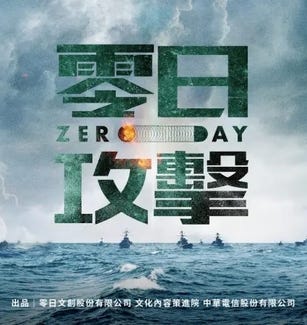A Mainland China invasion of Taiwan would shake global markets, small businesses, and lives on Main Street
Talking About …
Zero Day
China's Obsession
Destiny Awaits
The Military Options
The Manchurian Parallel
China's New Reality: Conquest's Hidden Costs
The Global Technology Landscape: Rewired and Rerouted
The Economic Calculus
Impact: The Stakeholder Fallout
Recommendations: Strategic Responses
The Risk is Not to be Prepared
Sources
Zero Day
I stood on the shores of Xiamen, China and found I didn't have to strain to see Taiwan. The day was gorgeous, the sky a light blue, the waves but mere ripples, the island-nation so clear I felt I could reach out and touch it.
I could understand how the average Mainland Chinese citizen would feel Taiwan was "theirs."
I was leading a delegation of American businessmen to meet local government officials of one of the Special Economic Zones near the city. An obnoxious American — bald, heavy-set, wearing a bracelet of beads from a local stall — said something about maintaining democracy in Taiwan.
It was one of those head-smack moments, when you wonder how such a waste of space could be allowed in the entourage. The Chinese official guiding us was a young woman, well-spoken, casually dressed. She merely smiled at the American's indelicacy.
The statement was the equivalent of an American in Toronto remarking to a councilman how Canada would make such a nice 51st state.
The Chinese official continued smoothly with her sales pitch of the area and suggested a lunch banquet of local seafood and beer made in the area. We gladly assented and dispelled the momentary uneasiness.
Less than a handful of years later, while still living and working in the Mainland, I would write the book China Inside Out: 10 Irreversible Trends Reshaping China (John Wiley & Sons, 2010). The last chapter of the book is about China's military and the Taiwan issue.
So while the delegation may have left Taiwan behind, the island has managed to stay in front of us all.
Taiwan since its founding in 1949 has never been more vulnerable to military aggression from the Mainland than now.
After all, America has lost its allies in Asia. Trump has destabilized domestic politics and the economy, and collapsed diplomacy. The current United States regime has also gutted and demoralized its military.
America has never presented a better opportunity to China to snag the prize on which it has had its eye for decades.
So intent has China's military gaze been on the island, Taiwanese filmmakers have produced a TV mini-series about how such an invasion would unfold. The show, called Zero Day, brings the immediacy of a conflict across the Taiwan Strait to the government, society, and everyday lives of Taiwanese. It is slated to air in the summer of 2025.
This is a good time, then, that American investors, businesses, and even customers assess the high-probability that China will make its move to capture Taiwan within three-to-four years.
Western stakeholders in the supply chain snaking its way through China, Japan, South Korea, Southeast Asia, and into the United States must weigh the scenarios set before them as century-defining moments that will shape the lives of generations.
Here, then, I propose scenarios for what may come should China invade Taiwan: what motivates China's animus toward the island-nation; where we have seen such aggression in recent Asian history; and some probable outcomes of an invasion of Taiwan for the markets, companies, and Main Street.
China's Obsession
Taiwan’s modern story began in 1949, when Chiang Kai-shek’s Nationalist government, defeated by Mao Zedong’s Communist forces, fled mainland China and reestablished the Republic of China on the island of Taiwan. Over one million people crossed the Taiwan Strait to Taipei, turning the island into the last stronghold of the Nationalists.
The People’s Republic of China, founded in Beijing that same year, vowed to reclaim Taiwan and has repeatedly declared its willingness to use force.
From the 1970s onward, the Chinese Communist Party intensified its campaign to isolate Taiwan diplomatically, pressuring countries and international organizations to recognize Beijing as the sole legal government of China. The United Nations expelled Taiwan in 1971, and Beijing steadily whittled down the number of countries maintaining formal ties with Taipei.
Economically, Beijing wielded both carrots and sticks. It promoted cross-strait trade and investment, aiming to bind Taiwan’s economy to the mainland. When Taiwan’s leaders resisted, China weaponized trade, imposing bans on agricultural products and threatening to suspend trade agreements to punish Taipei’s political choices, according to Reuters.
Espionage became another front. Chinese intelligence agencies infiltrated Taiwan’s government and military, recruiting spies and leaking secrets. The Washington Post reported that leaks exposed deep vulnerabilities in Taipei’s counterintelligence.
Militarily, in the past decade, China has conducted massive drills and sent warplanes and ships near Taiwan, signaling its readiness for invasion.
Yet, as long as the United States maintained its security commitments, the struggle has remained a tense stalemate.
Each side of the triangle is braced for conflict, but neither able to break the deadlock.
Destiny Awaits
Undaunted, China’s military activities against Taiwan have escalated dramatically in recent months. Naval exercises, air incursions, and missile tests now occur regularly just off Taiwan’s coast. These maneuvers are clear preparations for what could become the most consequential geopolitical event of our lifetime.
A Chinese invasion of Taiwan would trigger economic and political shockwaves that would dwarf the disruption caused by the COVID pandemic. The world’s most critical technology supply chains would collapse overnight. Markets would plunge. The international order that has governed global relations since World War II would fracture.
And Main Streets throughout America would become ghost towns.
The Military Options …
Keep reading with a 7-day free trial
Subscribe to Future Forwarded to keep reading this post and get 7 days of free access to the full post archives.






